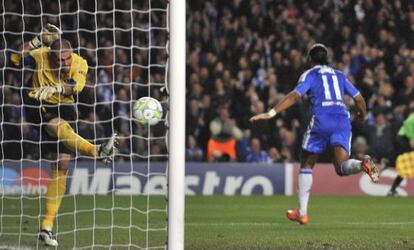Barça seeks route past London bus
Protecting a slender lead, Chelsea will set out to stifle home side’s attacking intent

There isn't a lot of time to stop and reflect at this stage of the season, with important games stacked up one after another. However, Chelsea will take a slight psychological edge into Tuesday night's Champions League second-leg semifinal match at Camp Nou after a goalless weekend tie against Arsenal — the closest thing the Premier League has to Barcelona — that was practically a dress rehearsal in how to cling on to a slender 1-0 lead.
"Chelsea played with three defensive midfielders so it was difficult to play through the middle," noted Arsène Wenger after Saturday's match. "They wanted to practice the system they will use on Tuesday."
Barcelona, meanwhile, suffered a second loss in four days, to Real Madrid, practically conceding the Liga title and giving José Mourinho's side the added satisfaction of having finally beaten Pep Guardiola's team within 90 minutes on the 14th attempt since the former Spain midfielder took over at Camp Nou. Guardiola admitted afterward that he may have erred in tactics but still maintained that his side had been unfortunate, not outplayed. "The adjective 'disappointing' is not appropriate for what we did in London or here. Disappointing is when your players do not perform. It's one thing to win or lose but disappointing is not the right word."
There is little prospect of Chelsea taking the game to Barça — Roberto di Matteo's side mustered a single shot on goal in the first leg — so Guardiola will be faced for the third time in a week with the conundrum of how to break down a side with 10 men behind the ball for much of the game. Against Real, Barça enjoyed 73-percent possession; against Chelsea, 77 percent. History does not favor a feast of goals, Barcelona having scored just twice in its previous seven European semifinals at Camp Nou, a run during which it recorded a single victory. On the other hand, in 31 home games against English sides, Barça has lost just two, both to Liverpool.
Working in Barcelona's favor is the possible absence of Didier Drogba, the author of the only goal in London and a constant thorn in the visitors' back line, not least through his trademark theatrics. That would leave Fernando Torres to lead the Chelsea attack, and as is well documented the Spain forward has been far from prolific since swapping a red shirt for blue.
Barcelona is clearly a step ahead of the rest but the better team does not always win,” said Torres
Torres, however, does enjoy playing against Barcelona: at Atlético he scored seven in 10 league matches against the Catalans, including a pair of braces at Camp Nou.
"Barcelona is clearly a step ahead of the rest," said Torres. "They have reached the last five Champions League semifinals, which is not easy, but this is soccer. The better team does not always win."
Chelsea is unbeaten in 14 matches against Spanish opposition since Barça's 2-1 victory in the 2005-2006 Champions League knockout stages. The two sides have faced off four times since then, with three ties preceding Chelsea's win last Wednesday. Two of those came at Camp Nou, with score lines of 1-1 and 0-0, either of which would see the English team through to the final on this occasion.
Of concern to the Catalan faithful will be Leo Messi's scant prowess against Premier League teams; he has scored in just three of 16 matches against English opposition and never against Chelsea.
Another factor that may condition the game is the disciplinary situation of both sides. Branislav Ivanovic and Ashley Cole of Chelsea, and Barça defenders Carles Puyol and Javier Mascherano all stand to miss the final should they receive a caution on Tuesday.
Tu suscripción se está usando en otro dispositivo
¿Quieres añadir otro usuario a tu suscripción?
Si continúas leyendo en este dispositivo, no se podrá leer en el otro.
FlechaTu suscripción se está usando en otro dispositivo y solo puedes acceder a EL PAÍS desde un dispositivo a la vez.
Si quieres compartir tu cuenta, cambia tu suscripción a la modalidad Premium, así podrás añadir otro usuario. Cada uno accederá con su propia cuenta de email, lo que os permitirá personalizar vuestra experiencia en EL PAÍS.
¿Tienes una suscripción de empresa? Accede aquí para contratar más cuentas.
En el caso de no saber quién está usando tu cuenta, te recomendamos cambiar tu contraseña aquí.
Si decides continuar compartiendo tu cuenta, este mensaje se mostrará en tu dispositivo y en el de la otra persona que está usando tu cuenta de forma indefinida, afectando a tu experiencia de lectura. Puedes consultar aquí los términos y condiciones de la suscripción digital.








































